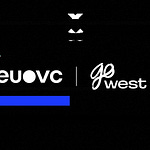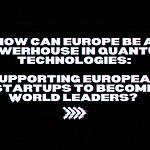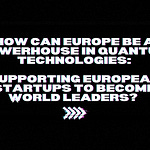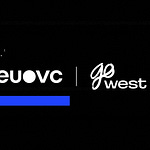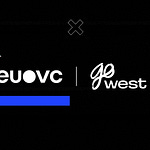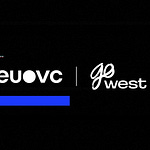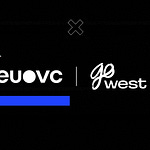In today’s episode of the EUVC podcast, Andreas is joined by Bogdan Iordache, General Partner at Underline Ventures, and Jakob Stein, Vice President at Creandum, for a roundtable discussion on the latest insights from the Venture in Eastern Europe Report launched yesterday by How to Web Conference.
Eastern Europe’s venture scene has grown remarkably, with an increase in international funding and a maturing ecosystem producing more globally competitive startups than ever before. With capital flowing into follow-on rounds at an unprecedented rate and local funds growing their influence, the region is no longer an "exotic" investment destination—it’s a strategic one.
In this conversation, we explore why Eastern European founders have to work harder to prove themselves, how global investors are adapting their strategies for the region, and which startup hubs are leading the charge in gaming, SaaS, and AI. We’ll also unpack the findings from the latest Venture in Eastern Europe report, which highlights key investment trends, the role of local and international capital, and the biggest challenges still facing founders in the region.
Watch it here or add it to your episodes on Apple or Spotify 🎧 chapters for easy navigation available on the Spotify/Apple episode.
Venture in Eastern Europe 2024 Report – Now Available!
Explore the latest trends shaping the startup and investment landscape across 22 Eastern European countries. The Venture in Eastern Europe 2024 Report by How to Web provides in-depth insights into the region’s top startups, key funding data, and emerging opportunities.
✍️ Show notes
1. State of Venture Funding in Eastern Europe
Venture funding in Eastern Europe has shown resilience, maintaining strong investment levels post-2021, unlike many other European regions that experienced a downturn. The data indicates that not only has the number of deals increased, but the overall investment volume has remained stable, with significant funding flowing into later-stage rounds. This stability reflects the maturation of the ecosystem, where successful companies continue to attract capital, and follow-on investments have become a driving force in the region’s growth. Compared to Western Europe, where many venture markets have cooled, Eastern Europe has maintained its momentum, supported by breakout successes like UiPath, which have helped put the region on the global venture map.
Despite this progress, the region is still evolving, with differences in investment trends among individual countries. While some countries like Poland and Romania are seeing a rise in later-stage funding, others remain more focused on pre-seed and seed deals. Events like the How to Web Conference and the release of comprehensive ecosystem reports have played a key role in bringing transparency to the investment landscape. The perception of Eastern Europe as a venture backwater is shifting, and the consistent deal flow suggests that investors are beginning to view the region as an integral part of the broader European venture ecosystem.
2. The Role of Follow-on Investments
A major takeaway from the report is the dominance of follow-on investments in Eastern Europe, with Series A, B, and C rounds making up 63% of the total investment volume. This indicates that while early-stage funding remains relatively stable, the region is witnessing an increasing number of companies progressing to later stages and attracting significant capital. This trend reflects a maturing ecosystem where startups are not only surviving but scaling effectively. Notably, the growth in follow-on funding suggests that early-stage investors are making better selection choices, and startups are benefiting from improved guidance, leading to stronger businesses capable of securing subsequent rounds from global investors.
This increase in follow-on rounds is also indicative of the broader professionalization of Eastern European venture. Many of these later-stage rounds are being backed by international investors, reinforcing the notion that Eastern European startups are no longer regional players but global contenders. As Bogdan pointed out, one of the most important findings in the report is that while early-stage investments may fluctuate year to year, the number of Eastern European startups successfully reaching Series A and beyond is steadily increasing. This signals not only a deepening capital pool but also an improving track record of company success.
3. Eastern Europe’s Strengths & Challenges in Venture
Eastern Europe’s biggest strength is its strong engineering culture, producing highly skilled technical talent that rivals that of Silicon Valley. Founders from the region are known for their ability to build groundbreaking technologies, particularly in enterprise software, AI, and deep tech. However, while technical expertise is abundant, founders often struggle with storytelling and commercial positioning, making it harder to attract investors at early stages. Unlike in the US, where founders can raise funding based on ambitious visions and strong networking, Eastern European founders tend to be more pragmatic, emphasizing facts over hype. While this honesty is an asset in later-stage fundraising, it can make pre-seed and seed rounds more difficult to secure.
One of the region’s ongoing challenges is the variability of early-stage funding, which is often tied to institutional capital such as European Investment Fund (EIF) programs. These government-backed programs create fluctuations in early-stage deal volume, leading to inconsistencies in funding availability. Additionally, many of the most promising startups are often headquartered in the UK or the US, making it difficult to track the true impact of the region. While this helps companies access international capital, it also means that many of Eastern Europe’s biggest successes are not immediately recognized as part of the local ecosystem.
4. Geographic Differences & Specialties
Eastern Europe is not a monolithic market; different countries have developed sectoral strengths that make them unique within the broader venture landscape. Turkey, for example, has become a powerhouse in gaming, with numerous successful studios emerging in recent years. Romania has excelled in enterprise SaaS and AI, producing companies that attract international investment due to their technical depth. Poland has historically been strong in marketplaces but is now seeing a surge in AI-driven startups. Hungary and Estonia, on the other hand, have developed deep expertise in product-led growth (PLG) models, particularly in B2C software, where companies focus on organic user acquisition rather than traditional sales-led approaches.
While these sectoral strengths exist, it’s important not to limit founders to predefined categories. As Jakob pointed out, many of the most successful companies in Eastern Europe are built by founders who defy regional expectations. For example, Slovenia, which is not widely recognized as a major tech hub, has produced global successes in both B2C and enterprise robotics. Similarly, Croatian startups have made significant strides in travel technology. Ultimately, while some countries may have natural advantages in certain sectors, talent and ambition can emerge from anywhere in the region, and founders should not feel constrained by historical trends.
5. Local vs. International Investment Trends
A key shift in the Eastern European ecosystem has been the growing role of local funds, with investment from regional VCs increasing by 50% this year. Historically, Eastern European startups relied heavily on international investors for follow-on funding, but this trend is changing as local VCs gain more experience and larger fund sizes. This increase in local investment not only strengthens the ecosystem but also gives founders a stronger foundation before seeking international capital. Local investors are now playing a more active role in helping startups refine their business models and prepare for global expansion, reducing the gap between early-stage funding and later-stage growth.
At the same time, international investors are becoming more comfortable investing in Eastern Europe. As Jakob highlighted, top-tier funds no longer see the region as an "exotic" market but rather as a natural extension of the European venture landscape. The presence of established local investors also makes it easier for international funds to deploy capital, as they can rely on trusted regional partners to source and vet deals. This dual dynamic—stronger local funding combined with continued international interest—suggests that Eastern Europe is reaching a new level of venture maturity.
6. Capital Accessibility & Fundraising Dynamics
Despite the increasing presence of international investors, capital is still more difficult to raise for Eastern European startups compared to their Western counterparts. One of the main reasons for this is perception—many investors still see Eastern European startups as riskier or less proven than those from more established venture markets. This results in higher capital costs and more stringent due diligence for founders from the region. Unlike in Silicon Valley, where strong networking and storytelling can sometimes outweigh actual metrics, Eastern European startups often need to demonstrate more tangible traction before securing funding.
This funding gap is particularly evident at the pre-seed and seed stages, where local institutional programs play a critical role. While these funds help early-stage startups survive, they can also create volatility in funding availability, as they are often subject to political and economic cycles. On the flip side, the strong technical expertise of Eastern European founders means that by the time they reach Series A and beyond, they often have a more solid foundation than their Western peers. This paradox—early-stage struggle but late-stage strength—defines the unique fundraising dynamics of the region.
7. International Perception of Eastern Europe
Eastern European talent is highly regarded globally, with many of the world's top engineers and technical leaders coming from the region. Companies like Databricks and OpenAI have benefited from Eastern European expertise, reinforcing the region’s reputation as a deep tech powerhouse. However, while Eastern Europeans are respected on an individual level, there is still a lack of awareness about the region itself. Many US investors struggle to differentiate between Eastern European countries, often lumping them together without understanding their unique strengths and ecosystems.
Additionally, geopolitical concerns have occasionally created hesitation among international investors, even though most startups operate in a fully globalized context. As Jakob pointed out, investors need to distinguish between Eastern European individuals (who are widely celebrated) and Eastern Europe as a venture market (which is still gaining credibility). The challenge moving forward is not only maintaining the strong technical reputation but also improving the narrative around the region as a top-tier destination for venture capital.
8. VC Approaches to Eastern Europe
For top-tier firms like Creandum, investing in Eastern Europe requires a hands-on approach. Rather than waiting for deals to come to them, they actively visit the region, build relationships with local investors, and engage with founders early in their journey. Creandum has refined its approach by ensuring they get in front of promising startups as soon as they raise their first check. By maintaining strong ties with local funds, they can identify the most competitive teams and help them scale internationally. Unlike some investors who view Eastern Europe opportunistically, Creandum treats it as an essential part of its broader European strategy.
On the other side, local investors like Underline Ventures play a crucial role in bridging the gap between Eastern European startups and international capital. As Bogdan highlighted, local VCs need to provide not just funding but also mentorship, helping founders navigate cultural differences and refine their pitches for global investors. The collaboration between local and international investors is essential for unlocking the full potential of the region, ensuring that its most promising startups have the support needed to become global category leaders.
Some things are made for platforms - music, cabs & pizzas. But fund solutions aren’t one of them. Their individual client focus and regulation-first approach is your guarantee for flexible solutions accommodative to a broad range of deal and client specifics. The kicker? Prices that match any of the shelf-products in the market.
🤗 Join the EUVC Community
Looking for niche, high-quality experiences that prioritize depth over breadth? Consider joining our community focused on delivering content tailored to the experienced VC. Here’s what you can look forward to as a member:
Exclusive Access & Discounts: Priority access to masterclasses with leading GPs & LPs, available on a first-come, first-served basis.
On-Demand Content: A platform with sessions you can access anytime, anywhere complete with presentations, templates and other resources.
Interactive AMAs: Engage directly with top GPs and LPs in exclusive small group sessions — entirely free for community members.
✍🏻 Masterclass | VC Fund Finance: Essential Tools, Strategies and Applications
Join us for an in-depth session on VC Fund Finance: Essential Tools, Strategies and Applications. Fund finance has become an essential consideration for fund managers navigating the complexities of venture capital. Offering tools such as Subscription Lines (also called Capital Call lines), NAV financing, and GP Support/Co-invest financing, fund finance provides structured solutions to manage liquidity, bridge capital needs, and align investment strategies with long-term goals.
This masterclass provides a comprehensive overview of fund finance, its origins, and its application across the lifecycle of a fund. Designed for fund managers at varying stages, the session balances conceptual frameworks with actionable insights, making it particularly valuable for second-time or larger fund GPs, while also addressing the needs of emerging managers exploring fund finance for the first time.
⏰ Feb. 26 | 💻 Online | Trusted and praised by industry leaders and fund managers. Here’s what some of them had to say about working with James.
✍🏻 EUVC Masterclass | Marketing Foundations for Fund Managers
Join us for an engaging workshop tailored for fund managers looking to institutionalise their marketing approach and craft a category-defining investment brand.
This masterclass is designed to go beyond traditional marketing advice on tactics to help you create lasting brand equity, ensuring your fund stands out in a competitive landscape.
This session will provide actionable insights into fund positioning, LP communications, and crafting compelling narratives - all while maximising time for Q&A to address your specific challenges.
⏰ March 13 | 💻 Online |
✍🏻 EUVC Masterclass | Setting up and Structuring a VC Fund
Emerging fund managers face countless challenges when setting up and structuring their first VC fund. The process is complex, daunting, and full of pitfalls, from navigating legal frameworks to engaging with the right service providers, the foundations you lay now will shape your growth trajectory.
That’s why we’re planning an exclusive 3-hour masterclass designed to equip emerging managers with the insights, strategies, and tools needed to tackle these challenges head-on.
⏰ Jun. 02 | 🇩🇪 Berlin | This masterclass is a side-event taking place during SuperVenture & SuperReturn.
🗓️ The VC Conferences You Can’t Miss
There are some events that just have to be on the calendar. Here’s our list, hit us up if you’re going, we’d love to meet!
0100 Europe 2025 | 📆 02 - 04 April 2025 | 🇳🇱 Amsterdam, The Netherlands
0100 Emerging Europe 2025 | 📆 14-16 May 2025 | 🇭🇺 Budapest, Hungary
GITEX Europe 2025 | 📆 23 - 25 May 2025 | 🇩🇪 Berlin, Germany











